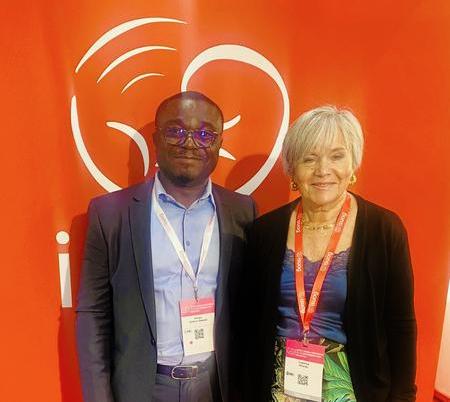Prof. Katia Bilardo and Dr Kwaku Doffour-Dapaah met through their committee membership roles at ISUOG. As a result, they developed a mentorship that has had a profound impact on the care of the patients Kwaku works with in Ghana.
Katia Bilardo is an emeritus professor in obstetrics and fetal medicine from the Netherlands and was the ISUOG President from 2018-2020, before her retirement in 2020. Throughout her career in fetal medicine, she has specialised in the use of ultrasound for detecting anomalies - this involved research and mentoring PhD students, alongside clinical practice.
Kwaku Doffour-Dapaah works at the Greater Accra Regional Hospital in Ghana, as a senior obstetrician/gynecologist and maternal fetal medicine specialist. He also teaches medical students and residents on a programme that aims to train more obstetricians and gynecologists in the region.
The two met virtually in 2021 through the ISUOG Patient information task force, of which they were both members. Kwaku reached out to Katia as he admired her influential work with ISUOG and her research. And so began a mentorship that was incredibly gratifying for both parties, one that helped Kwaku enhance his expertise in detecting congenital abnormalities in ultrasound scans, therefore improving the quality of care received by his patients in Accra.
Kwaku expressed that sometimes with very difficult cases and hard-to-decipher scans, the opinion of an expert in the field was needed to help with diagnoses, and he noticed this gap. In Ghana there are not very many consultants specialised in fetal medicine, which is why the expertise Katia was able to share with Kwaku was so essential. Kwaku highlighted that he and his colleagues also face challenges with the type of equipment they have at their disposal which sometimes affects their ability to obtain good quality images, increasing the challenge of interpreting the scans.
Kwaku said: “My motivation was to ensure that I could get myself very well trained and then extend that support to others. I think it’s really helpful because you get to interact with people who have a lot more experience.”
Katia and Kwaku met for the first time in person at the ISUOG World Congress 2024 in Budapest.

Katia recognised that when Kwaku reached out to her she was able to learn a lot about the framework in different countries and how their healthcare systems operate. She reflected on how meaningful the experience of being a mentor was for her.
“The impact that you can have is very large. There is nothing more important and more gratifying than passing on your knowledge and seeing how people can benefit from it."
Katia continued to say that mentorship with people in lower-resource countries is a form of outreach that is quite accessible for doctors to do virtually, without having to take time out of their busy schedules to travel. She said she knows of many people who have wanted to volunteer on ISUOG outreach trips but haven’t been able to, but this is a great alternative, and still a way to help ‘teach the teacher’.
“You give a lecture and lots of people listen to it but you don’t know what happens with the knowledge that is passed on. Whereas in this case you really have the feeling that you can follow up with the person and follow the growth of this person and the impact of what you have taught to him or her.”
And ultimately this impact spans to the patients themselves, says Kwaku: “The whole aim is to impact the patients so even though the interaction has not been directly with the patient it has been to the benefit of a lot of the patients.”
After training in Ghana, with clinical rotations in the USA and Canada it was a top priority of Kwaku’s to get back home to Ghana, to treat people in a place of great need, and to work on a programme that could change the landscape of fetal medicine and improve the quality of care for Ghanaian women and newborns.
“A couple of years ago we wouldn’t have thought that we would be seeing so many women who’s unborn babies had congenital anomalies. The demand for the care is huge here and it’s important that we get as many hands as we can to care for the patients who need that level of care.”
Learn more about ISUOG outreach.
